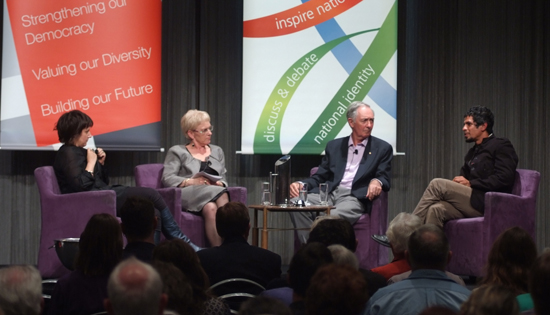Imagining Australia - what should our country look like in 2050?
Tuesday 26 October 2010
5.30pm for a 6.00pm start
![]() Listen here to this Podcast (25MB mp3 format)
Listen here to this Podcast (25MB mp3 format)
Jointly presented by the Australia Day Council of South Australia and The Bob Hawke Prime Ministerial Centre
Audience members at this event kindly contributed a single word describing an issue or a topic that they felt was important in the context of Imagining Australia in 2050.
Here are their words ..... (PDF format)
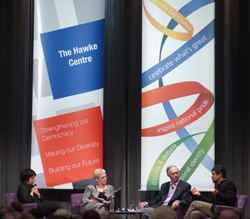
Why did Australia federate in 1901? - a complex question, but most agree that the burning topics of the era, such as trade, defence, and immigration, were great spurs to our nationhood.
One hundred years on there are huge challenges that are again bringing us together to find national solutions - health, education, infrastructure, water, population, climate change and sustainability. So taking these as a backdrop, what shape should we be in by 2050? What would the ideal Australia look like? How do we get there?
This forum will ask three Australians with very different backgrounds and interests to take on this challenging question, and to offer us their special insights into a successful future for Australia, and how to make it happen
Panel
- Ms Wendy Campana, Chief Executive Officer, Local Government Association of South Australia
- Professor Ian Lowe AO, President of the Australian Conservation Foundation
- Mr Shanaka Fernando, founder of Lentil as Anything not-for-profit restaurant chain and winner of the 2007 Australia's Local Hero Award.
MC: Amanda Blair: 5AA Radio
Biographies
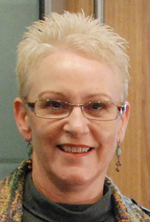 Wendy Campana is the Chief Executive Officer of the Local Government Association of South Australia. She has an extensive background in public sector management, organisational development, education and training, industrial relations, intergovernmental relations, governance and political lobbying.
Wendy Campana is the Chief Executive Officer of the Local Government Association of South Australia. She has an extensive background in public sector management, organisational development, education and training, industrial relations, intergovernmental relations, governance and political lobbying.
She will give her perspectives on the place and status of Local Government in the system of government in Australia in 2050. Particular emphasis will be given to community driven local communities and the nature of the services Councils will provide, the relationship they will have with the other spheres of government and the engagement of local communities in the business of local governance.
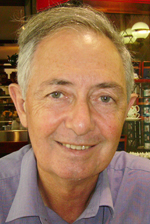 Ian Lowe is emeritus professor of science, technology and society at Griffith University in Brisbane and holds adjunct appointments at two other universities. A Fellow of the Australian Academy of Technological Sciences and Engineering, he has been President of the Australian Conservation Foundation since 2004.
Ian Lowe is emeritus professor of science, technology and society at Griffith University in Brisbane and holds adjunct appointments at two other universities. A Fellow of the Australian Academy of Technological Sciences and Engineering, he has been President of the Australian Conservation Foundation since 2004.
He was made an Officer of the Order of Australia in 2001 for services to science and technology, especially environmental science. He wrote a weekly column for New Scientist for 13 years and received the 2002 Eureka Prize for Promotion of Science. He also received in 2000 the Australian Prime Minster's Environmental Award for Outstanding Individual Achievement and the Queensland Premier's Millennium Award for Excellence in Science.
He directed Australia's Commission for the Future in 1988 and chaired the advisory council that produced the first national report on the state of the environment in 1996. He helped develop the framework for the UNEP Global Environmental Outlook reports and has acted as a referee for the Inter-governmental Panel on Climate Change, the Millennium Assessment and the International Geosphere-Biosphere Program. In 2009 the International Academy of Sciences awarded him the Konrad Lorenz Gold Medal.
Abstract:
It will be difficult to sustain the way we are currently living, and the sort of growth being promoted is unsustainable. Our present lifestyle does not satisfy any of the main criteria. We are using resources future generations will need, most obviously oil, we are over-using renewable resources like water, we are damaging environmental systems and reducing social stability by widening the gap between rich and poor. Some are actively promoting population growth, when we know even the present level of consumption is eroding our natural capital. We can achieve a transition to a sustainable future by 2050, but it requires fundamental changes to values and social institutions.
Achieving it by 2050 meant discarding the simplistic view that economic growth would solve our problems. In 2010, most Australians already had all the essentials of a decent life and more; economic growth was not making people happier or more fulfilled, but was doing social and environmental damage. Creating a sustainable future involved using resources efficiently, maintaining ecological values, developing social cohesion, nurturing our cultural traditions and finding durable economic activities. Balancing those dimensions was a complex task that defied simple approaches, like trusting the market or trying to keep everything the way it was. Difficult decisions had to be taken about which things to change and which to preserve. Such decisions were only politically sustainable because we developed an open and transparent process, involving the entire community and allowing time to work through the costs and benefits of alternatives.
Above all, we have accepted that moving toward a sustainable future was our moral obligation to our own children, trying to ensure that they would have the life chances we took for granted.
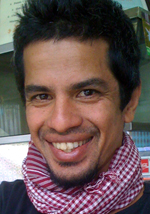 Shanaka Fernando was born in Sri Lanka, and since his late teens Shanaka has travelled extensively throughout countries including Kenya, Brazil, Thailand and Indonesia, curious about the culture of people who have little contact with civilization, people living more closely with nature. Shanaka was named Local Hero in the Australia Day awards in 2007 for his non-profit, socially responsible, pay-as-you-feel Lentil As Anything restaurants. These vegetarian restaurants, which include the school canteen at Collingwood College, feed thousands every week and set an example for other restaurants and business to follow - an example which illustrates what an inclusive, ethical approach to business, and life, can achieve. In his restaurants, 'It's people that qualify life, not property. You get fed and treated with dignity even if you don't have any money, the colour of your skin and your education and your beliefs only put you on a par with everyone else.' Shanaka lives and promotes a simple lifestyle and resided in a tent for three years in the dunes behind a Melbourne beach. Sometimes he performs comedy at local clubs. He is always pushing causes for the less privileged.
Shanaka Fernando was born in Sri Lanka, and since his late teens Shanaka has travelled extensively throughout countries including Kenya, Brazil, Thailand and Indonesia, curious about the culture of people who have little contact with civilization, people living more closely with nature. Shanaka was named Local Hero in the Australia Day awards in 2007 for his non-profit, socially responsible, pay-as-you-feel Lentil As Anything restaurants. These vegetarian restaurants, which include the school canteen at Collingwood College, feed thousands every week and set an example for other restaurants and business to follow - an example which illustrates what an inclusive, ethical approach to business, and life, can achieve. In his restaurants, 'It's people that qualify life, not property. You get fed and treated with dignity even if you don't have any money, the colour of your skin and your education and your beliefs only put you on a par with everyone else.' Shanaka lives and promotes a simple lifestyle and resided in a tent for three years in the dunes behind a Melbourne beach. Sometimes he performs comedy at local clubs. He is always pushing causes for the less privileged.
Abstract:
Lentil as anything has taught me many valuable lessons. More than anything, the strength of action rather than words. By just making food available and asking for nothing in return, people have responded with generosity, fairness, sophistication and pride. The culture of engagement has to be under the assumption that everyone is great and has something invaluable to offer. We have to broaden the boundary of acceptability. People are our greatest asset. The future relies on as many people being made comfortable to contribute their participation to the progress of Australia and the rest of humanity.
Whilst academic education is important, it is even more important that the membership of everyone is valued - not just in theory, but attitude as well. We have to take on board the condescension and patronization associated with an overemphasis on diplomas, degrees and doctorates. There is a man who lives down my street who puts his rather large telescope on the footpath (on clear nights) and invites passes by to a closer observation of outer space - he has a wealth of knowledge in this field yet nothing in the form of formal education. The pub next to his house obscures part of the sky gave rise to my favorite line "mate come back at 8.30 when Jupiter comes over the pub".
Felix, a Russian cobbler, begins all customer interactions by putting his hand in the drawer, pulling out a chocolate- and insisting that it is eaten before any negotiating begins - it's a business doing pleasure with him.
These are a couple or examples that bring a unique quality to society. The many different cultures that add to our fabric will be encouraged by our open mindedness .The community values they bring along with the incredible closeness of our indigenous culture should be incorporated into our psyche. Rather than trying to treat symptoms such as mental health, isolation, depression, obesity, climate change we need to get to the root of the issues. Kindness, trust and generosity are potent qualities. Our values need to be evaluated. We live in a society that encourages material acquisition as a means of self expression. Yet our sense of ingenuity, uniqueness and the empowerment this brings needs to stand out.
Ultimately the pay as you feel philosophy is an encouragement of self empowerment and this is the path to 2050.
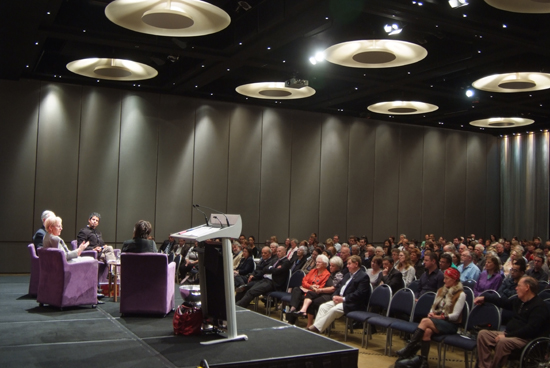
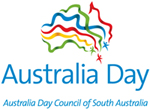 |
 |
While the views presented by speakers within the Hawke Centre public program are their own and are not necessarily those of either the University of South Australia or The Hawke Centre, they are presented in the interest of open debate and discussion in the community and reflect our themes of: strengthening our democracy - valuing our diversity - and building our future.
The copying and reproduction of any transcripts within the Hawke Centre public program is strictly forbidden without prior arrangements.



